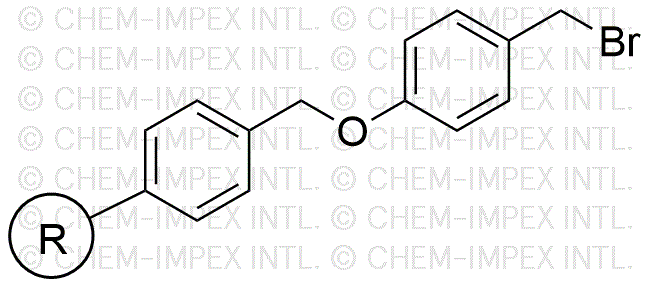4-Benzyloxybenzyl bromide resin is widely utilized in research focused on:
- Peptide Synthesis: This resin serves as a solid support in the synthesis of peptides, allowing for efficient coupling reactions and easy purification, which is crucial in pharmaceutical development.
- Drug Discovery: It is employed in combinatorial chemistry to create diverse libraries of compounds, facilitating the identification of potential drug candidates.
- Material Science: The resin can be used in the development of novel materials, particularly in creating functionalized surfaces for sensors and other applications.
- Bioconjugation: It aids in the attachment of biomolecules to surfaces or other compounds, enhancing the functionality of diagnostic tools and therapeutic agents.
- Research in Organic Chemistry: The resin is a valuable tool for organic chemists in the exploration of reaction mechanisms and the synthesis of complex organic molecules.
General Information
Properties
Safety and Regulations
Applications
4-Benzyloxybenzyl bromide resin is widely utilized in research focused on:
- Peptide Synthesis: This resin serves as a solid support in the synthesis of peptides, allowing for efficient coupling reactions and easy purification, which is crucial in pharmaceutical development.
- Drug Discovery: It is employed in combinatorial chemistry to create diverse libraries of compounds, facilitating the identification of potential drug candidates.
- Material Science: The resin can be used in the development of novel materials, particularly in creating functionalized surfaces for sensors and other applications.
- Bioconjugation: It aids in the attachment of biomolecules to surfaces or other compounds, enhancing the functionality of diagnostic tools and therapeutic agents.
- Research in Organic Chemistry: The resin is a valuable tool for organic chemists in the exploration of reaction mechanisms and the synthesis of complex organic molecules.
Documents
Safety Data Sheets (SDS)
The SDS provides comprehensive safety information on handling, storage, and disposal of the product.
Product Specification (PS)
The PS provides a comprehensive breakdown of the product’s properties, including chemical composition, physical state, purity, and storage requirements. It also details acceptable quality ranges and the product's intended applications.
Certificates of Analysis (COA)
Search for Certificates of Analysis (COA) by entering the products Lot Number. Lot and Batch Numbers can be found on a product’s label following the words ‘Lot’ or ‘Batch’.
*Catalog Number
*Lot Number
Certificates Of Origin (COO)
This COO confirms the country where the product was manufactured, and also details the materials and components used in it and whether it is derived from natural, synthetic, or other specific sources. This certificate may be required for customs, trade, and regulatory compliance.
*Catalog Number
*Lot Number
Safety Data Sheets (SDS)
The SDS provides comprehensive safety information on handling, storage, and disposal of the product.
DownloadProduct Specification (PS)
The PS provides a comprehensive breakdown of the product’s properties, including chemical composition, physical state, purity, and storage requirements. It also details acceptable quality ranges and the product's intended applications.
DownloadCertificates of Analysis (COA)
Search for Certificates of Analysis (COA) by entering the products Lot Number. Lot and Batch Numbers can be found on a product’s label following the words ‘Lot’ or ‘Batch’.
*Catalog Number
*Lot Number
Certificates Of Origin (COO)
This COO confirms the country where the product was manufactured, and also details the materials and components used in it and whether it is derived from natural, synthetic, or other specific sources. This certificate may be required for customs, trade, and regulatory compliance.


